#data security facebook
Explore tagged Tumblr posts
Text
Faceache
Go to https://accountscenter.facebook.com/info_and_permissions/off_facebook_activity/?entry_point=ACCOUNTS_CENTER to find out what all apps and sites have been sharing your info with Facebook, because I don't remember giving pharmacies and banks and all the (many) rest permission, but here we are...
7 notes
·
View notes
Text
For Security Purposes, I am Shutting Down the Wild Hemlock Facebook and Instagram Accounts
Meta knows every website you visit that has the Meta Pixel installed.
And who you are.

Don't worry - I'm staying here on Tumblr! But stop by and take a look at the New and Improved WildHemlock.Com!
As explained by The Register, Hacker News, and elsewhere, all of the apps created by Meta (formerly Facebook) are exploiting a permission in the Android operating system to track everything you do on mobile web browsing apps such as Chrome, Firefox, and even partially DuckDuckGo. According to LifeHacker, the mobile web browser Brave successfully blocked the tracking. I could not find any information about other web browsers such as Vivaldi or the many additional Firefox flavors.
So how is Meta doing this exactly? First, let’s talk about apps. The Instagram app only allows you to post via mobile app which is additionally nefarious. When Meta’s apps are installed on your phone, it will continually run in the background as a service. This grants the app additional privileges. For a popular example, YouTube didn’t always use to be able to make a video play while you were using another app. It was rewritten some time ago as a service, as opposed to a normal app, and now it can play both audio or picture-in-picture while you use your phone and other apps because it has more permissions. This is the type of app that Facebook and Instagram are.
Android services have access to what is referred to as localhost. Think of it like the local device hosting the app – it is an address which loops back to your phone. The address is 127.0.0.1 in web browsing – it points back to your own computer. If you were hosting a service on your computer, it would open service when you type “127.0.0.1” into the address bar of your web browser. This is very useful for developers, both on a mobile phone or computer, especially for testing network programming.
Wild Hemlock Will NEVER Install a Meta Pixel Script!
Learn More @ WildHemlock.Com!
#wildhemlock#wild#hemlock#localhost#facebook#meta#instagram#leavingfacebook#leavinginstagram#opsec#security#mobile phone#android#meta pixel#surveillance#data leak#tech explained#basic opsec#basic security#tech#technology#technology explained#social media#article#small business#etsy#shop small#leaving facebook#leaving instagram
2 notes
·
View notes
Text
In the past week, I have had 1100 attempts by Tumblr to track me.
Most of these attempts are by Facebook, with a few attempts by google (for funsies, one assumes).
The information they want includes my name, email, gender, network, location, fingerprint, cookies, and every single bit of information about my device (its brand, id, storage, memory, screen resolution, rotation, battery, advertising id, etc).
Most of this information is probably out there somewhere or the other, in the Great Cloud. I have blocked all these attempts on principle.
Anywa-
#privacy#data safety#data theft#online security#google#facebook#tumblr#device tracking#i live the global capitalist era i swear#u believe me right Big Brother?
2 notes
·
View notes
Text

Here’s why I don’t use Facebook.
For ‘may’ read ‘will’.
5 notes
·
View notes
Text
guys guys ? someone just friended me on spacehey and i checked out their profile and it turns out theyre working on a project that's similar to spacehey but for facebook. it's called offline
#i think ill make an account !!! it looks fun :3#i read all the privacy policy too. the whole site is based on user data security unlike actual facebook
1 note
·
View note
Text
This is not news to me, but most people I know probably don't have a grasp of how much information big tech corps actually gather and store about you.
They know about your gender, age, religion, hobbies, political orientation, skills, problems, whereabouts, family and loved ones, finance, job,...
Also, keep this in mind whenever a government tries to pass a law that forces companies to disclose data about their users to the government.
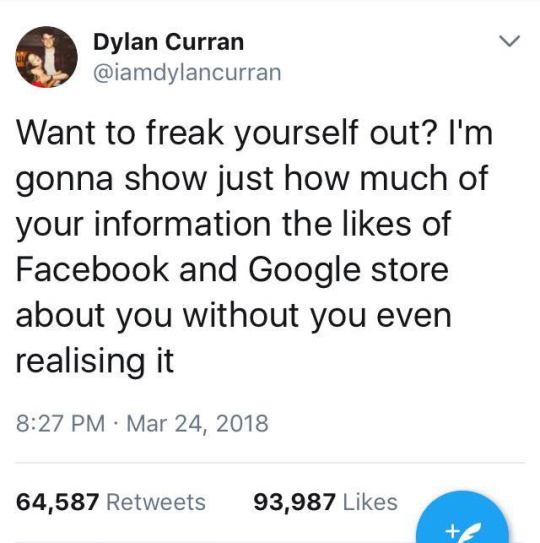

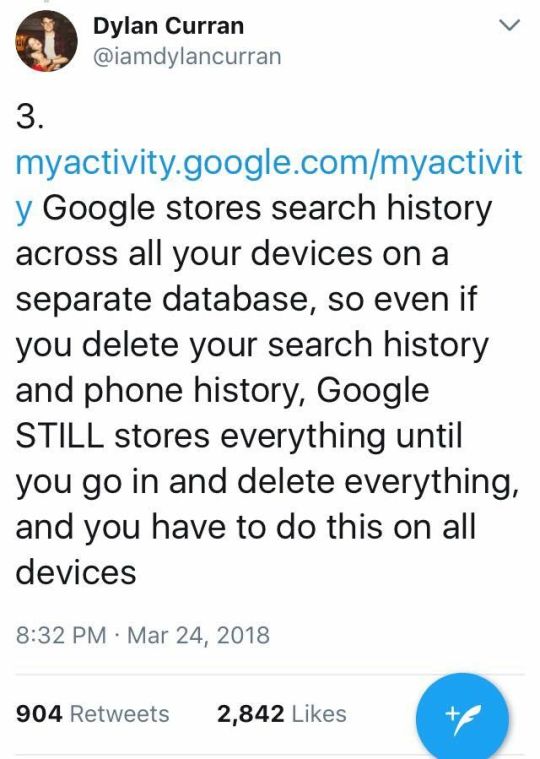
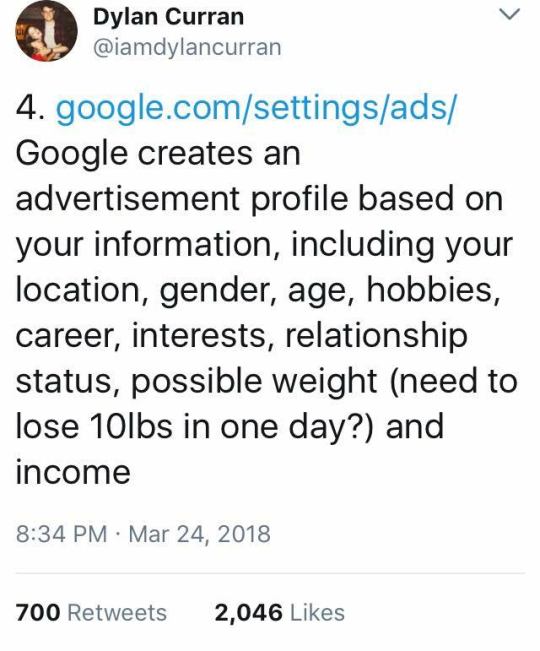
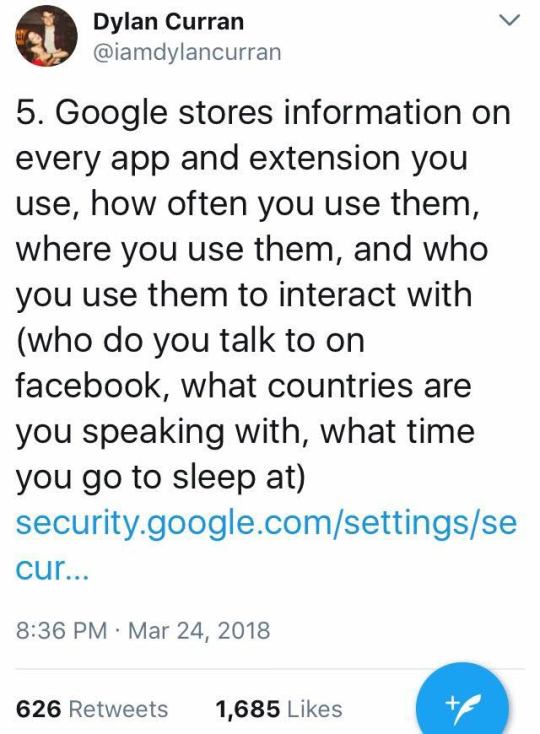

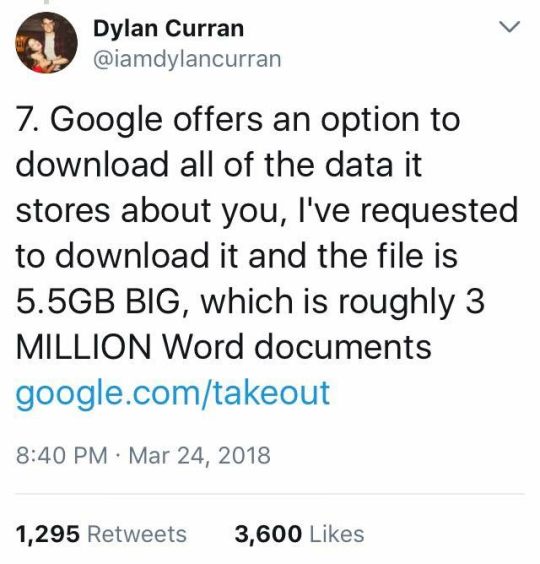
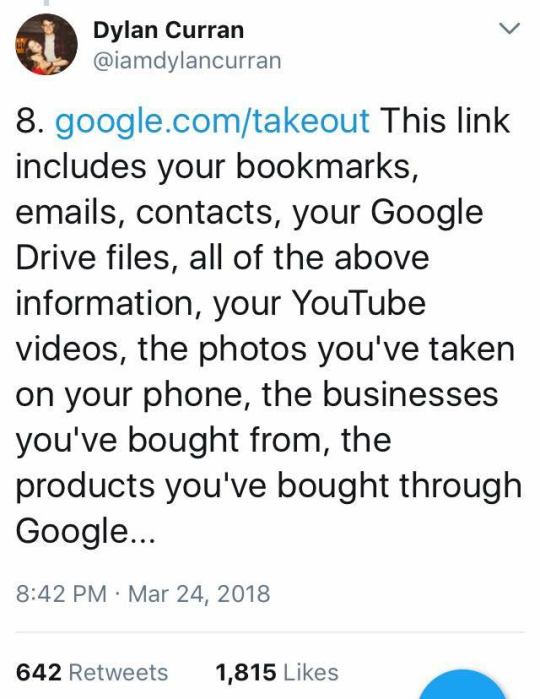
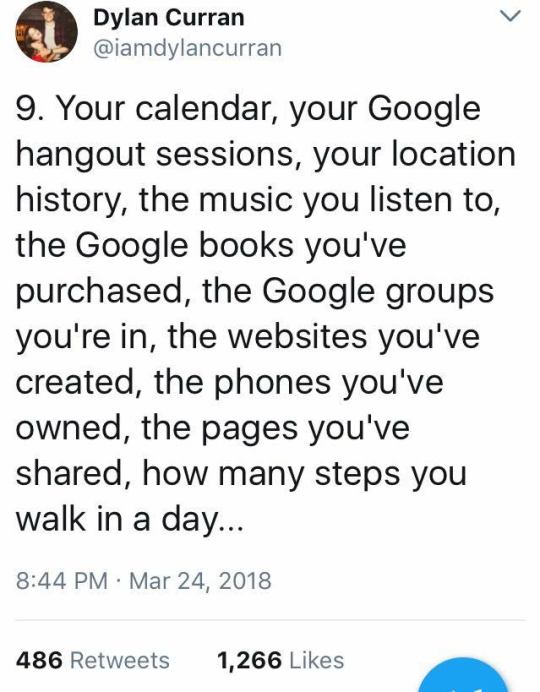


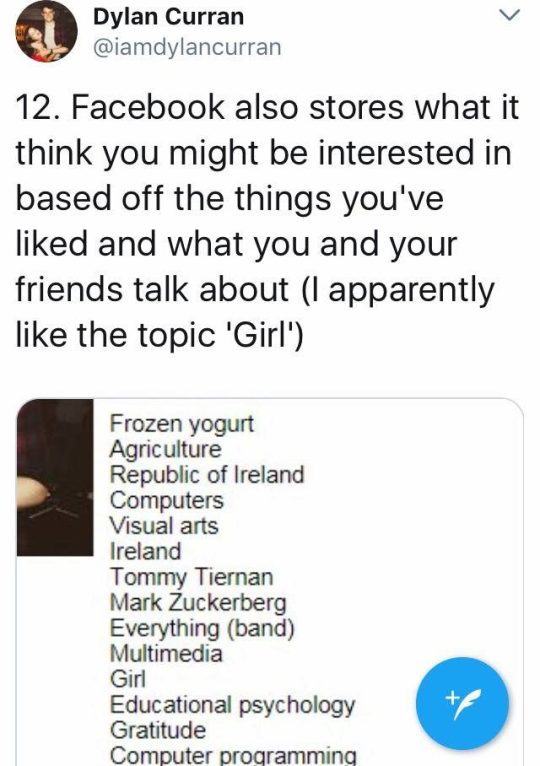
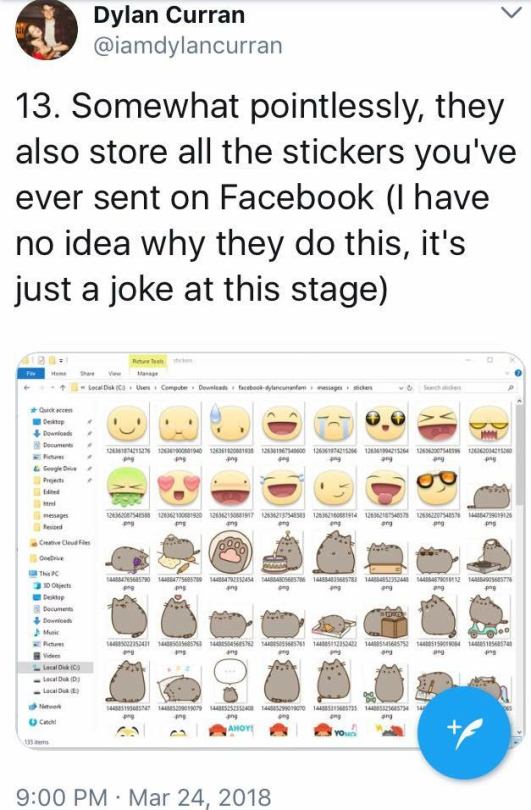
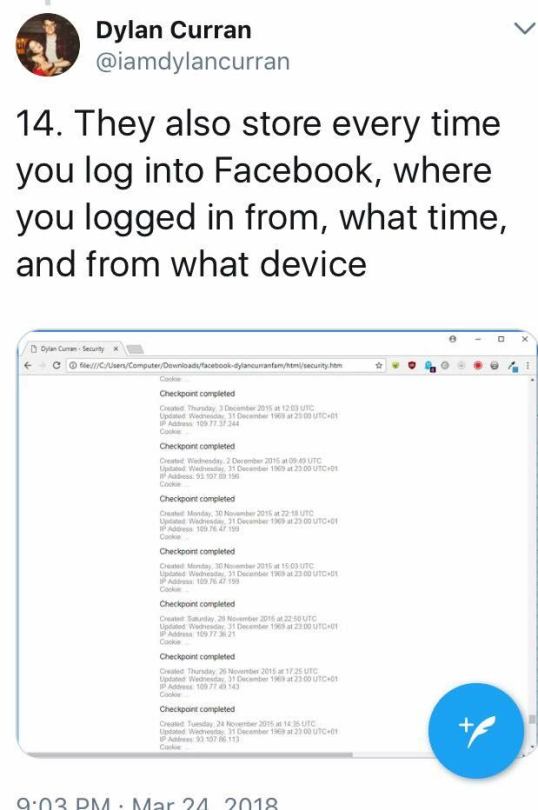





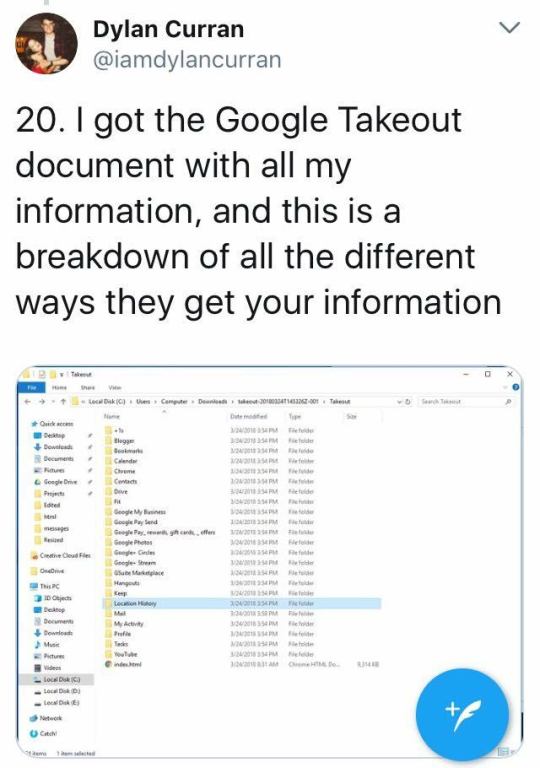

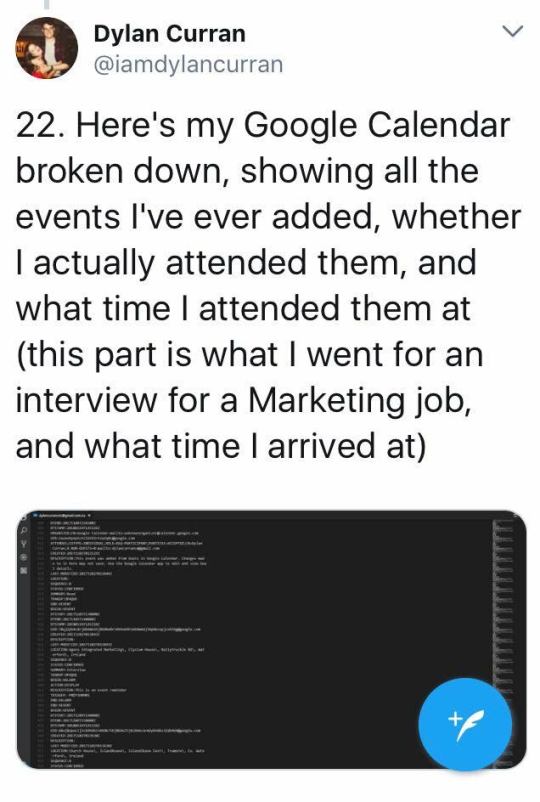
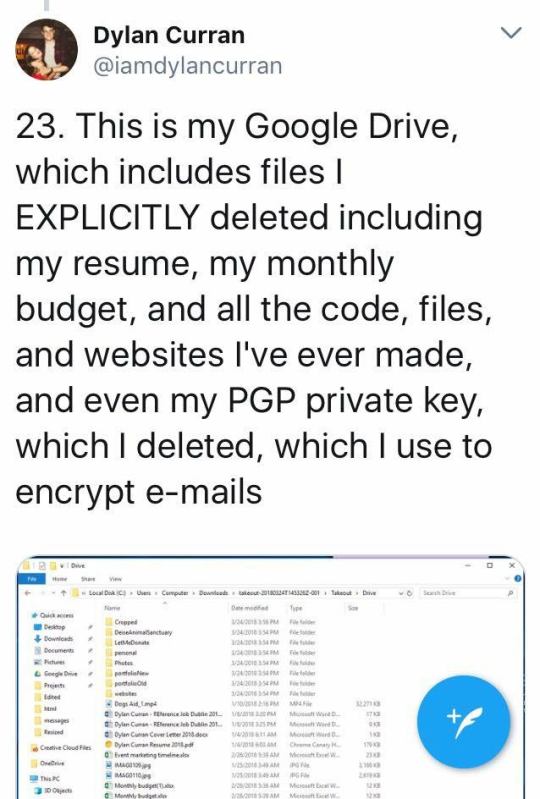

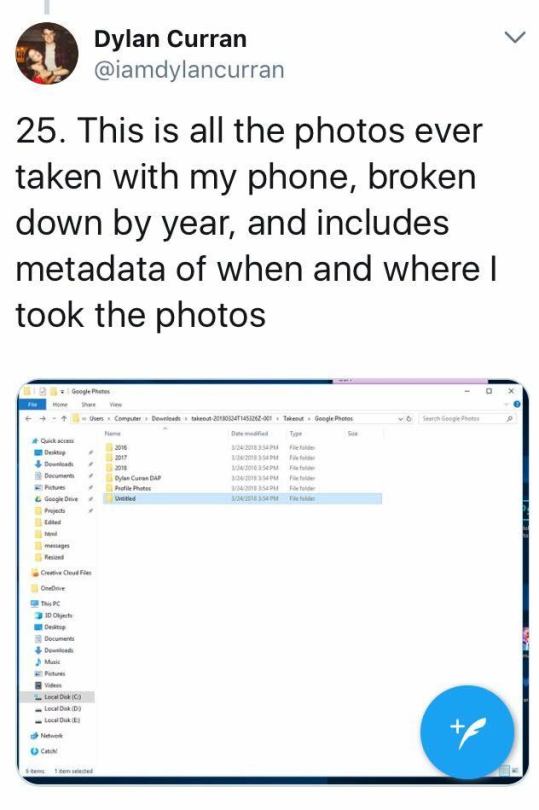

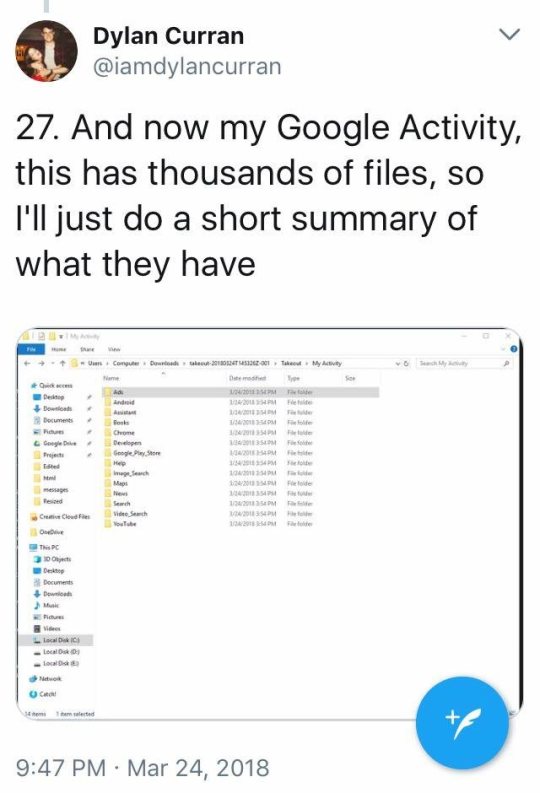

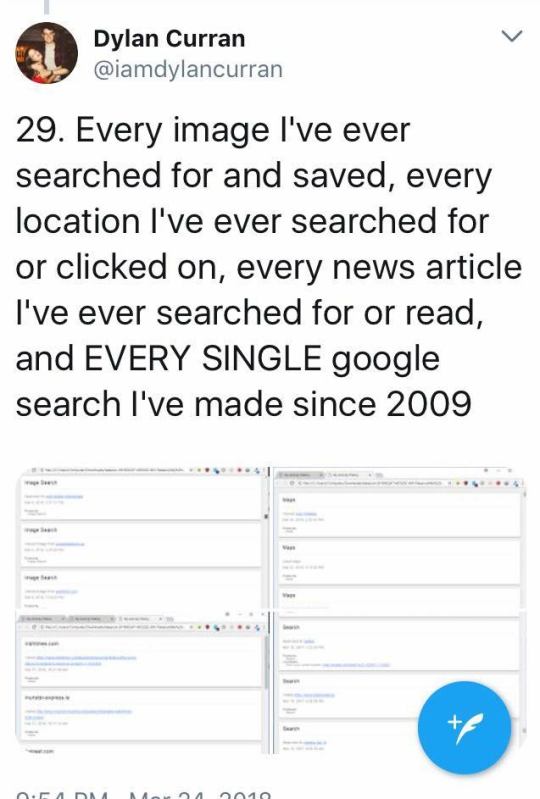
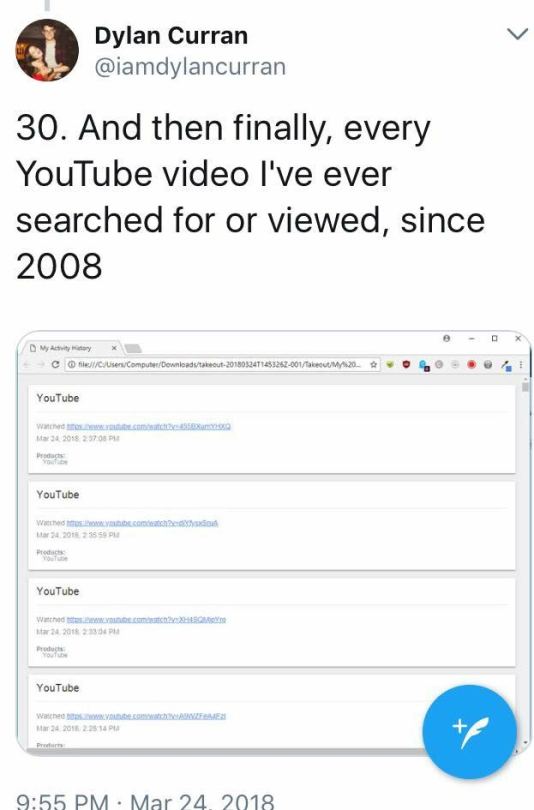


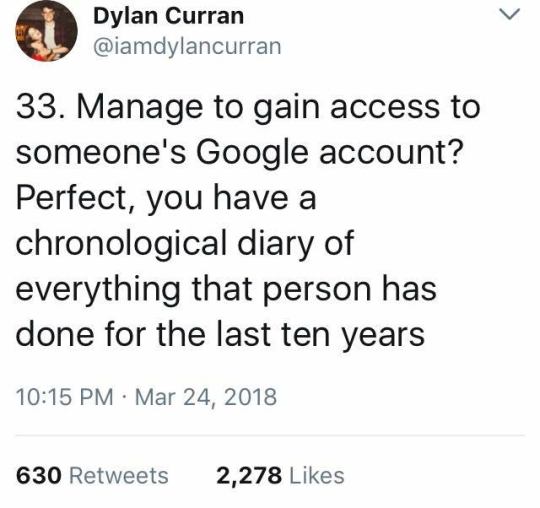
Via @iamdylancurran (Twitter)
152K notes
·
View notes
Text
#TechKnowledge Do you know what is Data Center?
Swipe to uncover what it is!
👉 Follow us for more simple, useful tech tips!
💻 Explore insights on the latest in #technology on our Blog Page 👉 https://simplelogic-it.com/blogs/
🚀 Ready for your next career move? Check out our #careers page for exciting opportunities 👉 https://simplelogic-it.com/careers/
#techterms#technologyterms#techcommunity#techinsight#techtalk#knowledgeIispower#didyouknow#datacenter#data#digitalinformation#google#facebook#security#makeitsimple#simplelogicit#simplelogic#makingitsimple#itservices#itconsulting
0 notes
Text
Correcting a Chinese kid's English homework that another American got wrong on a Chinese app named after Mao Zedong's Little Red Book as part of a mass online temper tantrum to help save TikTok was not on my 2025 bingo card, but here we are.
This might actually be the political fuck-up of the century. Our politicians are all 900 year old crypt keepers who probably turn off their computers by unplugging them from the wall. Were there a single synapse in their decrepit domes focused on something besides their next payday, they might have thought twice about challenging Millennials and Zoomers on the internet. I repeat, ON THE INTERNET. Oh to have the confidence of an octogenarian born into generational wealth.
Something I need people to understand is the "security threat" doesn't just stop at data. The mere act of normal Chinese and American citizens interacting scares the shit out of governments on both sides. I'm already seeing videos from folks here in the US talking about how shocked they were at the grocery hauls in China, and how much they could get with very little. Chinese people are watching Americans absolutely dog walk their own government and talk it for filth. People are having fun.
All rich people had to do was remember the deal. Americans are terrible people. If they had just paid folks enough to buy a house, an electric car, and a vacation once a year they'd sit in front of the TV in a docile fugue state while the wealthy shoved their boots up the ass of the global south. Now who knows what's going to happen. I just know it's a testament to how done with Mark Zuckerberg's ass people are that they're rather learn Mandarin than go back to Facebook.
I think 2025 is about to be a ride.
21K notes
·
View notes
Text

I've seen a number of people worried and concerned about this language on Ao3s current "agree to these terms of service" page. The short version is:
Don't worry. This isn't anything bad. Checking that box just means you forgive them for being US American.
Long version: This text makes perfect sense if you're familiar with the issues around GDPR and in particular the uncertainty about Privacy Shield and SCCs after Schrems II. But I suspect most people aren't, so let's get into it, with the caveat that this is a Eurocentric (and in particular EU centric) view of this.
The basic outline is that Europeans in the EU have a right to privacy under the EU's General Data Protection Regulation (GDPR), an EU directive (let's simplify things and call it an EU law) that regulates how various entities, including companies and the government, may acquire, store and process data about you.
The list of what counts as data about you is enormous. It includes things like your name and birthday, but also your email address, your computers IP address, user names, whatever. If an advertiser could want it, it's on the list.
The general rule is that they can't, unless you give explicit permission, or it's for one of a number of enumerated reasons (not all of which are as clear as would be desirable, but that's another topic). You have a right to request a copy of the data, you have a right to force them to delete their data and so on. It's not quite on the level of constitutional rights, but it is a pretty big deal.
In contrast, the US, home of most of the world's internet companies, has no such right at a federal level. If someone has your data, it is fundamentally theirs. American police, FBI, CIA and so on also have far more rights to request your data than the ones in Europe.
So how can an American website provide services to persons in the EU? Well… Honestly, there's an argument to be made that they can't.
US websites can promise in their terms and conditions that they will keep your data as safe as a European site would. In fact, they have to, unless they start specifically excluding Europeans. The EU even provides Standard Contract Clauses (SCCs) that they can use for this.
However, e.g. Facebook's T&Cs can't bind the US government. Facebook can't promise that it'll keep your data as secure as it is in the EU even if they wanted to (which they absolutely don't), because the US government can get to it easily, and EU citizens can't even sue the US government over it.
Despite the importance that US companies have in Europe, this is not a theoretical concern at all. There have been two successive international agreements between the US and the EU about this, and both were struck down by the EU court as being in violation of EU law, in the Schrems I and Schrems II decisions (named after Max Schrems, an Austrian privacy activist who sued in both cases).
A third international agreement is currently being prepared, and in the meantime the previous agreement (known as "Privacy Shield") remains tentatively in place. The problem is that the US government does not want to offer EU citizens equivalent protection as they have under EU law; they don't even want to offer US citizens these protections. They just love spying on foreigners too much. The previous agreements tried to hide that under flowery language, but couldn't actually solve it. It's unclear and in my opinion unlikely that they'll manage to get a version that survives judicial review this time. Max Schrems is waiting.
So what is a site like Ao3 to do? They're arguably not part of the problem, Max Schrems keeps suing Meta, not the OTW, but they are subject to the rules because they process stuff like your email address.
Their solution is this checkbox. You agree that they can process your data even though they're in the US, and they can't guarantee you that the US government won't spy on you in ways that would be illegal for the government of e.g. Belgium. Is that legal under EU law? …probably as legal as fan fiction in general, I suppose, which is to say let's hope nobody sues to try and find out.
But what's important is that nothing changed, just the language. Ao3 has always stored your user name and email address on servers in the US, subject to whatever the FBI, CIA, NSA and FRA may want to do it. They're just making it more clear now.
10K notes
·
View notes
Note
Do you have thoughts about the changes to Firefox's Terms of Use and Privacy Notice? A lot of people seem to be freaking out ("This is like when google removed 'Don't be evil!'"), but it seems to me like just another case of people getting confused by legalese.
Yeah you got it in one.
I've been trying not to get too fighty about it so thank you for giving me the excuse to talk about it neutrally and not while arguing with someone.
Firefox sits in such an awful place when it comes to how people who understand technology at varying levels interact with it.
On one very extreme end you've got people who are pissed that Firefox won't let you install known malicious extensions because that's too controlling of the user experience; these are also the people who tend to say that firefox might as well be spyware because they are paid by google to have google as the default search engine for the browser.
In the middle you've got a bunch of people who know a little bit about technology - enough to know that they should be suspicious of it - but who are only passingly familiar with stuff like "internet protocols" and "security certificates" and "legal liability" who see every change that isn't explicitly about data anonymization as a threat that needs to be killed with fire. These are the people who tend not to know that you can change the data collection settings in Firefox.
And on the other extreme you've got people who are pretty sure that firefox is a witch and that you're going to get a virus if you download a browser that isn't chrome so they won't touch Firefox with a ten foot pole.
And it's just kind of exhausting. It reminds me of when you've got people who get more mad at queer creators for inelegantly supporting a cause than they are at blatant homophobes. Like, yeah, you focus on the people whose minds you can change, and Firefox is certainly more responsive to user feedback than Chrome, but also getting you to legally agree that you won't sue Firefox for temporarily storing a photo you're uploading isn't a sign that Firefox sold out and is collecting all your data to feed to whichever LLM is currently supposed to be pouring the most bottles of water into landfills before pissing in the plastic bottle and putting the plastic bottle full of urine in the landfill.
The post I keep seeing (and it's not one post, i've seen this in youtube comment sections and on discord and on tumblr) is:
Well-meaning person who has gotten the wrong end of the stick: This is it, go switch to sanguinetapir now, firefox has gone to the dark side and is selling your data. [Link to *an internet comment section* and/or redditor reactions as evidence of wrongdoing].
Response: I think you may be misreading the statements here, there's been an update about this and everything.
Well-meaning (and deeply annoying) person who has gotten the wrong end of the stick: If you'd read the link you'd see that actually no I didn't misinterpret this, as evidenced by the dozens of commenters on this other site who are misinterpreting the ToU the same way that I am, but more snarkily.
Bud.
Anyway the consensus from the actual security nerds is "jesus fucking christ we carry GPS locators in our pockets all goddamned day and there are cameras everywhere and there is a long-lasting global push to erode the right to encrypt your data and facebook is creating tracking accounts for people who don't even have a facebook and they are giving data about abortion travel to the goddamned police state" and they could not be reached for comment about whether Firefox is bad now, actually, because they collect anonymized data about the people who use pocket.
My response is that there is a simple fix for all of this and it is to walk into the sea.
(I am not worried about the updated firefox ToU, I personally have a fair amount of data collection enabled on my browser because I do actually want crash reports to go to firefox when my browser crashes; however i'm not actually all that worried about firefox collecting, like, ad data on me because I haven't seen an ad in ten years and if one popped up on my browser i'd smash my screen with a stand mixer - I don't care about location data either because turning on location on your devices is for suckers but also *the way the internet works means unless you're using a traffic anonymizer at all times your browser/isp/websites you connect to/vpn/what fucking ever know where you are because of the IP address that they *have* to be able to see to deliver the internet to you and that is, generally speaking, logged as a matter of course by the systems that interact with it*)
Anyway if you're worried about firefox collecting your data you should ABSOLUTELY NOT BE ON DISCORD OR YOUTUBE and if you are on either of those things you should 100% be using them in a browser instead of an app and i don't particularly care if that browser is firefox or tonsilferret but it should be one with an extension that allows you to choose what data gets shared with the sites it interacts with.
5K notes
·
View notes
Text
If anyone wants to know why every tech company in the world right now is clamoring for AI like drowned rats scrabbling to board a ship, I decided to make a post to explain what's happening.
(Disclaimer to start: I'm a software engineer who's been employed full time since 2018. I am not a historian nor an overconfident Youtube essayist, so this post is my working knowledge of what I see around me and the logical bridges between pieces.)
Okay anyway. The explanation starts further back than what's going on now. I'm gonna start with the year 2000. The Dot Com Bubble just spectacularly burst. The model of "we get the users first, we learn how to profit off them later" went out in a no-money-having bang (remember this, it will be relevant later). A lot of money was lost. A lot of people ended up out of a job. A lot of startup companies went under. Investors left with a sour taste in their mouth and, in general, investment in the internet stayed pretty cooled for that decade. This was, in my opinion, very good for the internet as it was an era not suffocating under the grip of mega-corporation oligarchs and was, instead, filled with Club Penguin and I Can Haz Cheezburger websites.
Then around the 2010-2012 years, a few things happened. Interest rates got low, and then lower. Facebook got huge. The iPhone took off. And suddenly there was a huge new potential market of internet users and phone-havers, and the cheap money was available to start backing new tech startup companies trying to hop on this opportunity. Companies like Uber, Netflix, and Amazon either started in this time, or hit their ramp-up in these years by shifting focus to the internet and apps.
Now, every start-up tech company dreaming of being the next big thing has one thing in common: they need to start off by getting themselves massively in debt. Because before you can turn a profit you need to first spend money on employees and spend money on equipment and spend money on data centers and spend money on advertising and spend money on scale and and and
But also, everyone wants to be on the ship for The Next Big Thing that takes off to the moon.
So there is a mutual interest between new tech companies, and venture capitalists who are willing to invest $$$ into said new tech companies. Because if the venture capitalists can identify a prize pig and get in early, that money could come back to them 100-fold or 1,000-fold. In fact it hardly matters if they invest in 10 or 20 total bust projects along the way to find that unicorn.
But also, becoming profitable takes time. And that might mean being in debt for a long long time before that rocket ship takes off to make everyone onboard a gazzilionaire.
But luckily, for tech startup bros and venture capitalists, being in debt in the 2010's was cheap, and it only got cheaper between 2010 and 2020. If people could secure loans for ~3% or 4% annual interest, well then a $100,000 loan only really costs $3,000 of interest a year to keep afloat. And if inflation is higher than that or at least similar, you're still beating the system.
So from 2010 through early 2022, times were good for tech companies. Startups could take off with massive growth, showing massive potential for something, and venture capitalists would throw infinite money at them in the hopes of pegging just one winner who will take off. And supporting the struggling investments or the long-haulers remained pretty cheap to keep funding.
You hear constantly about "Such and such app has 10-bazillion users gained over the last 10 years and has never once been profitable", yet the thing keeps chugging along because the investors backing it aren't stressed about the immediate future, and are still banking on that "eventually" when it learns how to really monetize its users and turn that profit.
The pandemic in 2020 took a magnifying-glass-in-the-sun effect to this, as EVERYTHING was forcibly turned online which pumped a ton of money and workers into tech investment. Simultaneously, money got really REALLY cheap, bottoming out with historic lows for interest rates.
Then the tide changed with the massive inflation that struck late 2021. Because this all-gas no-brakes state of things was also contributing to off-the-rails inflation (along with your standard-fare greedflation and price gouging, given the extremely convenient excuses of pandemic hardships and supply chain issues). The federal reserve whipped out interest rate hikes to try to curb this huge inflation, which is like a fire extinguisher dousing and suffocating your really-cool, actively-on-fire party where everyone else is burning but you're in the pool. And then they did this more, and then more. And the financial climate followed suit. And suddenly money was not cheap anymore, and new loans became expensive, because loans that used to compound at 2% a year are now compounding at 7 or 8% which, in the language of compounding, is a HUGE difference. A $100,000 loan at a 2% interest rate, if not repaid a single cent in 10 years, accrues to $121,899. A $100,000 loan at an 8% interest rate, if not repaid a single cent in 10 years, more than doubles to $215,892.
Now it is scary and risky to throw money at "could eventually be profitable" tech companies. Now investors are watching companies burn through their current funding and, when the companies come back asking for more, investors are tightening their coin purses instead. The bill is coming due. The free money is drying up and companies are under compounding pressure to produce a profit for their waiting investors who are now done waiting.
You get enshittification. You get quality going down and price going up. You get "now that you're a captive audience here, we're forcing ads or we're forcing subscriptions on you." Don't get me wrong, the plan was ALWAYS to monetize the users. It's just that it's come earlier than expected, with way more feet-to-the-fire than these companies were expecting. ESPECIALLY with Wall Street as the other factor in funding (public) companies, where Wall Street exhibits roughly the same temperament as a baby screaming crying upset that it's soiled its own diaper (maybe that's too mean a comparison to babies), and now companies are being put through the wringer for anything LESS than infinite growth that Wall Street demands of them.
Internal to the tech industry, you get MASSIVE wide-spread layoffs. You get an industry that used to be easy to land multiple job offers shriveling up and leaving recent graduates in a desperately awful situation where no company is hiring and the market is flooded with laid-off workers trying to get back on their feet.
Because those coin-purse-clutching investors DO love virtue-signaling efforts from companies that say "See! We're not being frivolous with your money! We only spend on the essentials." And this is true even for MASSIVE, PROFITABLE companies, because those companies' value is based on the Rich Person Feeling Graph (their stock) rather than the literal profit money. A company making a genuine gazillion dollars a year still tears through layoffs and freezes hiring and removes the free batteries from the printer room (totally not speaking from experience, surely) because the investors LOVE when you cut costs and take away employee perks. The "beer on tap, ping pong table in the common area" era of tech is drying up. And we're still unionless.
Never mind that last part.
And then in early 2023, AI (more specifically, Chat-GPT which is OpenAI's Large Language Model creation) tears its way into the tech scene with a meteor's amount of momentum. Here's Microsoft's prize pig, which it invested heavily in and is galivanting around the pig-show with, to the desperate jealousy and rapture of every other tech company and investor wishing it had that pig. And for the first time since the interest rate hikes, investors have dollar signs in their eyes, both venture capital and Wall Street alike. They're willing to restart the hose of money (even with the new risk) because this feels big enough for them to take the risk.
Now all these companies, who were in varying stages of sweating as their bill came due, or wringing their hands as their stock prices tanked, see a single glorious gold-plated rocket up out of here, the likes of which haven't been seen since the free money days. It's their ticket to buy time, and buy investors, and say "see THIS is what will wring money forth, finally, we promise, just let us show you."
To be clear, AI is NOT profitable yet. It's a money-sink. Perhaps a money-black-hole. But everyone in the space is so wowed by it that there is a wide-spread and powerful conviction that it will become profitable and earn its keep. (Let's be real, half of that profit "potential" is the promise of automating away jobs of pesky employees who peskily cost money.) It's a tech-space industrial revolution that will automate away skilled jobs, and getting in on the ground floor is the absolute best thing you can do to get your pie slice's worth.
It's the thing that will win investors back. It's the thing that will get the investment money coming in again (or, get it second-hand if the company can be the PROVIDER of something needed for AI, which other companies with venture-back will pay handsomely for). It's the thing companies are terrified of missing out on, lest it leave them utterly irrelevant in a future where not having AI-integration is like not having a mobile phone app for your company or not having a website.
So I guess to reiterate on my earlier point:
Drowned rats. Swimming to the one ship in sight.
36K notes
·
View notes
Video
youtube
Is FREE Truly FREE - Facebook
#youtube#Security Facebook Free Data Privacy Advertising Connectivity SocialMedia Analysis Technology
0 notes
Text
Are You A Part of the Meta?
0 notes
Link
Facebook Data Breach Sparks Global Privacy Concerns. The event highlights the importance of solid security and carefulness in safeguarding online privacy
0 notes
Text
Entry 9:
Unraveling the Web: How Facebook Collects Your Data
In the interconnected world of social media, Facebook stands as a giant. With over 2.8 billion monthly active users, it’s a treasure trove of data. But have you ever wondered how Facebook collects your data? Let’s delve into it.
What Data Does Facebook Collect?
Facebook collects a wide array of information. This includes the information you provide directly like your name, email, birthday, and location. It also includes the content you post, your friends list, the pages and hashtags you interact with, and even the type of device you’re using.
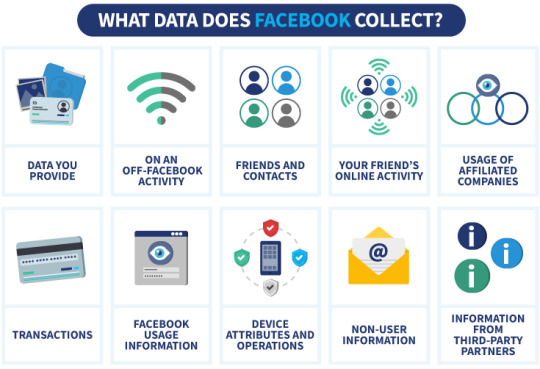
How Does Facebook Collect Data?
Directly from the Users: The most straightforward way Facebook collects data is directly from its users. When you sign up, you provide personal details. Every time you post a status, like a page, or start a chat, Facebook collects that information.
Through Your Actions: Facebook tracks your interactions. This includes the posts you like, the pages you follow, and the friends you have. This helps Facebook understand your preferences and tailor your News Feed.
Through Third-Party Apps and Websites: When you use your Facebook account to log into other apps or websites, Facebook receives data from these sites. This can include information about your activities and purchases.
Through Cookies: Like many websites, Facebook uses ‘cookies’ to collect data. These small pieces of data are stored on your browser and let Facebook track your activity both on and off the platform.
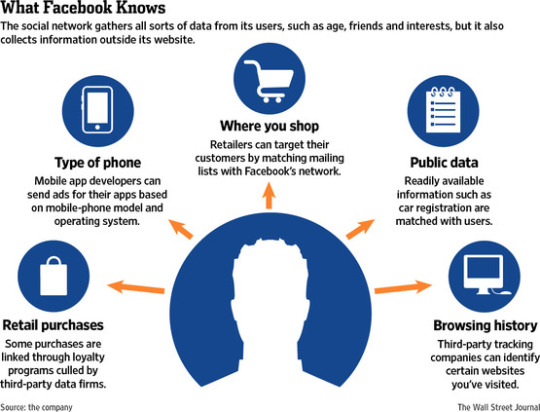
Why Does Facebook Collect Data?
Facebook collects data primarily to personalize your experience. By understanding your preferences, Facebook can show you relevant content, suggest new friends, and even target advertisements.
However, this extensive data collection has raised privacy concerns. It’s essential to regularly review your privacy settings and be mindful of the information you share.

Remember, in the digital world, knowledge is power. Understanding how platforms like Facebook collect and use your data is the first step towards protecting your online privacy.
#college#data#data privacy#university#data security#the philippines#Facebook#social media#data tracking#data collection
0 notes